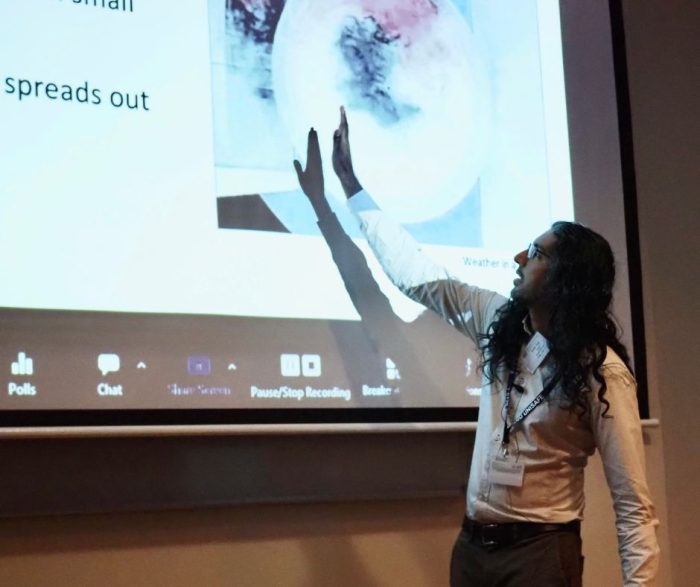Jonathan Brown with Centre researchers.

Long-term planning and investment will be vital in building Australia’s resilience to climate and weather extremes according to the Australian Government’s State of the Environment Report. Continuing to develop the fundamental science of climate extremes and investing in the scientific talent behind it will be vital for the state of the Australian environment.
The report finds that:
- The frequency and intensity of extreme events are changing
- Extreme events affect the natural environment and compound the impact of other pressures
- Extreme events affect our communities and wellbeing
- Management and adaptation – along with significant investment and better coordination – will be needed to increase resilience
Researchers at the ARC Centre of Excellence for Climate Extremes contributed to the report in a range of ways – with the Centre’s research informing climate modelling, analysis of significant weather and climate events and more. Centre Associate Investigator Dr Andrew King says the report is a wake-up call.
“While Australia has always been a land of extreme weather and climate variability – experiencing drought and heat, fires and floods – human-caused climate change is causing extremes to occur more often and with more devastating impacts” says Dr King.
“In recent years we’ve seen extreme events that have caused catastrophic damage to flora and fauna on land and in the oceans around Australia. Our greenhouse gas emissions are warming the planet and raising the odds of widespread fire events and deadly and destructive heatwaves. This report should act as a wake-up call to the damage we are doing to the world around us. We must decarbonise our economy and society as rapidly as possible to try and limit the environmental losses that we will experience as we keep warming the world.”
The ARC Centre of Excellence for Climate Extremes produces a yearly State of Weather and Climate Extremes Report summarising the previous year’s extreme weather and climate events. The 2021 report highlights many of the extreme events raised as concerns in the Australian Government’s State of the Environment Report.
Another focus of the Australian Government’s report is the role of compound weather and climate events, particularly in relation to emergency management:
“Climate change is expected to increase the risk of several natural hazards. Heatwaves and extreme fire weather are expected to become more common; extreme rainfall is expected to become more likely in many parts of the country; and higher sea levels are likely to increase hazards in coastal areas. This potentially increases losses as a result of natural hazards, as well as creating additional stresses on emergency management. Compound events, or coincident events in different parts of the country, are particularly stressful for emergency management capacity.”
Trewin B, Morgan-Bulled D & Cooper S (2021). Australia state of the environment 2021:
climate, independent report to the Australian Government Minister for the Environment,
Commonwealth of Australia, Canberra, DOI: 10.26194/rdze-5d59.
Natural disasters are often caused by a combination of multiple weather and climate hazards. The cumulative effect of these weather and climate hazards makes these events particularly devastating, causing severe impacts for communities, economies, and ecosystems. In climate science, these events are referred to as “compound events”. Compound events can put significant stress onto any socio-economic or ecological system, including those linked to food production and security, supply chain functionality, and insurance with their impacts reaching down to the individual level with property damage/loss, sickness, and even loss of life.
The Centre is conducting vital research and producing regular briefings to inform decision makers of the impact of compound events and research needed for Australia’s future resilience.
The State of the Environment Report has also highlight the importance of citizen science in helping researchers and decision makers. The Centre’s WeatheX and School Weather and Air Quality collaborations were highlighted as important examples of community participation in weather and climate research.
The ARC Centre of Excellence continues to produce research, build the skills of future climate scientists and collaborate with government, industry and policy makers to reduce Australia’s vulnerability to climate extremes.
